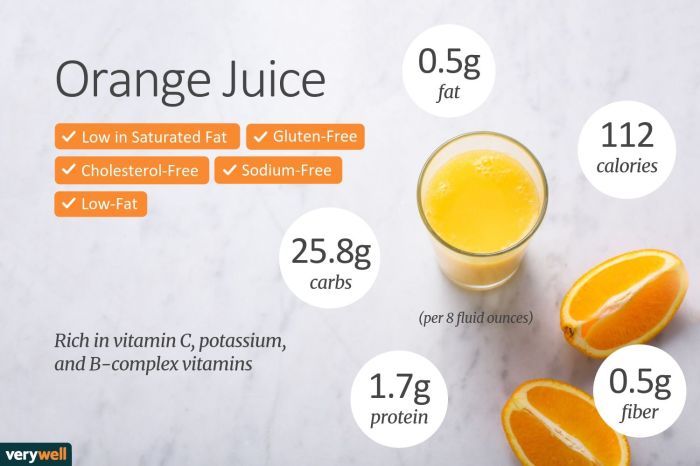Nutritional Composition of Orange Juice

Nutrition facts about orange juice – Orange juice, a vibrant and refreshing beverage, offers a delightful burst of flavor alongside a significant nutritional punch. Its nutritional profile is rich and varied, making it a popular choice for a healthy addition to many diets. However, the nutritional content can vary depending on the type of orange juice consumed. Let’s delve into the specifics.
Understanding nutrition facts is key to a balanced diet. Orange juice, for example, offers Vitamin C and potassium, but it’s also high in natural sugars. For a contrasting snack perspective, check out the goldfish crackers nutrition facts to see how they compare in terms of carbohydrates, sodium, and fat content. Returning to orange juice, remember moderation is important to maintain a healthy intake of sugars and overall caloric balance.
Macronutrient Breakdown in Orange Juice
The macronutrient composition of orange juice primarily consists of carbohydrates, with minimal protein and fat. A typical 8-ounce serving provides a balanced energy source, contributing to overall daily nutritional needs. The following table details the approximate macronutrient content:
| Nutrient | Amount per serving (8 oz) | % Daily Value | Units |
|---|---|---|---|
| Carbohydrates | 21g | 7% | grams |
| Protein | 2g | 4% | grams |
| Fat | 0g | 0% | grams |
Vitamins and Minerals in Orange Juice
Orange juice is a powerhouse of essential vitamins and minerals, particularly renowned for its high Vitamin C content. These nutrients play crucial roles in maintaining optimal health and well-being.
The following vitamins and minerals are particularly abundant in orange juice and contribute significantly to its nutritional value:
- Vitamin C (Ascorbic Acid): A potent antioxidant, crucial for immune function, collagen synthesis, and iron absorption. A deficiency can lead to scurvy, characterized by fatigue, bleeding gums, and skin problems.
- Potassium: An essential electrolyte vital for maintaining fluid balance, nerve function, and muscle contractions. Adequate potassium intake is linked to lower blood pressure.
- Folate (Vitamin B9): Essential for cell growth and development, particularly important during pregnancy to prevent neural tube defects. It also plays a role in DNA synthesis and red blood cell formation.
Nutritional Comparison: Freshly Squeezed vs. Concentrate
The nutritional content of orange juice can vary depending on its processing method. Freshly squeezed orange juice generally retains more nutrients than commercially produced juice from concentrate. This difference stems from the processing techniques involved, with pasteurization and concentration potentially affecting nutrient levels.
| Nutrient | Freshly Squeezed (per 8 oz) | From Concentrate (per 8 oz) |
|---|---|---|
| Vitamin C | Approximately 90mg | Approximately 70mg (can vary widely depending on brand and processing) |
| Potassium | Approximately 450mg | Approximately 400mg (can vary widely depending on brand and processing) |
| Folate | Approximately 50mcg | Approximately 40mcg (can vary widely depending on brand and processing) |
Health Benefits Associated with Orange Juice Consumption
Orange juice, a vibrant and refreshing beverage, offers a wealth of health benefits beyond its delightful taste. Its nutritional profile, packed with vitamins, minerals, and antioxidants, contributes significantly to overall well-being. This section explores the key ways in which regular orange juice consumption can positively impact health.
Immune Function Enhancement
The high concentration of vitamin C in orange juice plays a crucial role in bolstering the immune system. Vitamin C is a potent antioxidant that protects cells from damage caused by free radicals, and it is also essential for the production and function of white blood cells, the body’s primary defense against infection. Studies have shown a correlation between adequate vitamin C intake and reduced incidence and severity of respiratory illnesses like the common cold.
For instance, a meta-analysis published in theJournal of the American Medical Association* reviewed numerous studies and concluded that individuals with higher vitamin C intakes experienced shorter duration and less severe symptoms of colds. Furthermore, the presence of other immune-supporting nutrients in orange juice, such as folate and various flavonoids, contributes to its overall immune-boosting effects.
Antioxidant Properties and Overall Health
Orange juice is a rich source of antioxidants, which combat oxidative stress—a major contributor to chronic diseases. These antioxidants neutralize harmful free radicals, preventing them from damaging cells and tissues. The protective effects of antioxidants extend to various aspects of health, including reducing the risk of heart disease, certain cancers, and age-related cognitive decline.
- Vitamin C: A powerful antioxidant that protects cells from damage and supports immune function.
- Flavonoids: A diverse group of plant compounds with potent antioxidant and anti-inflammatory properties. Examples include hesperidin and naringenin, which are abundant in oranges.
- Carotenoids: These pigments contribute to the orange color of the juice and possess antioxidant properties, helping to protect against cellular damage.
Cardiovascular Health Benefits
Orange juice contributes to cardiovascular health through its significant potassium and vitamin C content. Potassium helps regulate blood pressure by counteracting the effects of sodium, a known contributor to hypertension. Adequate potassium intake is crucial for maintaining healthy blood pressure levels. Vitamin C, in addition to its antioxidant properties, plays a role in reducing inflammation and improving the function of blood vessels.
A diet rich in potassium and vitamin C, as can be achieved through regular orange juice consumption (in moderation), can contribute to a reduced risk of heart disease and stroke. Imagine a vivid image: the bright orange liquid, rich in these vital nutrients, flowing through the body, nourishing the heart and blood vessels. This visualization highlights the positive impact of orange juice on cardiovascular health.
Potential Drawbacks and Considerations
While orange juice offers a vibrant burst of flavor and a wealth of nutrients, excessive consumption can present certain drawbacks. Understanding these potential downsides allows for mindful enjoyment and prevents any negative health consequences. Moderation, as with most things, is key to reaping the benefits of this popular beverage.
The primary concern surrounding excessive orange juice intake is its naturally high sugar content. This can contribute to weight gain, increased risk of type 2 diabetes, and dental problems. The sweetness, while appealing, masks the significant amount of sugar present, making it easy to consume more than is beneficial. Furthermore, the acidic nature of orange juice can erode tooth enamel over time, leading to cavities and sensitivity.
Sugar Content Comparison
The sugar content varies depending on the type of orange juice. 100% orange juice generally contains less added sugar than many other fruit juices, but the natural sugars still add up. The following table illustrates the approximate sugar content per serving (typically 8 ounces) for various juices. These values can fluctuate slightly based on the brand and specific oranges used.
| Juice Type | Approximate Sugar Content (grams) |
|---|---|
| 100% Orange Juice | 20-25 |
| Apple Juice | 25-30 |
| Grape Juice | 30-35 |
| Pineapple Juice | 22-27 |
Medication Interactions
Orange juice’s high concentration of certain compounds can interact negatively with some medications, potentially altering their effectiveness or causing adverse reactions. It’s crucial to consult a physician or pharmacist before consuming orange juice if you are taking any of the medications listed below. These interactions are not exhaustive, and others may exist.
- Statins: Some statins, used to lower cholesterol, may have reduced effectiveness when taken with orange juice due to interactions with its components.
- Certain antibiotics: The absorption of some antibiotics can be affected by orange juice, potentially reducing their therapeutic effect.
- Calcium channel blockers: These medications, often prescribed for high blood pressure, may experience altered absorption when consumed with orange juice.
- Some immunosuppressants: The interaction between orange juice and certain immunosuppressants can impact the drug’s efficacy and should be carefully monitored.
Orange Juice in a Balanced Diet

Orange juice, when consumed judiciously as part of a varied and balanced diet, can contribute significantly to overall health and well-being. Its vibrant color hints at the abundance of nutrients it offers, but it’s crucial to understand its role within a larger nutritional framework to maximize its benefits and avoid potential drawbacks. This section explores how to incorporate orange juice effectively into a healthy eating plan and compares its nutritional profile to other breakfast choices.
A well-balanced diet should provide a spectrum of nutrients, including vitamins, minerals, carbohydrates, proteins, and healthy fats. Orange juice, with its rich vitamin C content and other beneficial compounds, fits seamlessly into this framework, contributing to the daily recommended intake of several essential nutrients.
Sample Meal Plan Incorporating Orange Juice, Nutrition facts about orange juice
The following meal plan illustrates how orange juice can be integrated into a healthy diet. Remember that portion sizes should be adjusted based on individual caloric needs and activity levels. This plan emphasizes whole foods, lean protein, and a variety of fruits and vegetables.
| Breakfast | Lunch | Dinner | Snacks |
|---|---|---|---|
| 1 cup orange juice, 1/2 cup oatmeal with berries, 1/4 cup chopped nuts | Salad with grilled chicken or fish, mixed greens, and a light vinaigrette dressing | Baked salmon with roasted vegetables (broccoli, carrots, sweet potatoes) and a small portion of brown rice | A small handful of almonds, a piece of fruit (apple, banana), or a small glass of unsweetened yogurt |
Role of Orange Juice in Meeting Daily Recommended Intakes
Orange juice plays a vital role in providing essential vitamins and minerals. Its high vitamin C content supports the immune system, aids in iron absorption, and acts as a potent antioxidant. It also contributes to the daily intake of potassium, a crucial electrolyte for maintaining fluid balance and healthy blood pressure. However, it’s important to remember that orange juice should complement, not replace, whole fruits and vegetables in a balanced diet to obtain a wider array of nutrients and fiber.
Comparison of Orange Juice to Other Breakfast Options
Several breakfast options offer nutritional value, but their composition varies considerably. Comparing orange juice to other common breakfast choices helps illustrate its place in a balanced diet. The following table highlights key nutritional differences.
| Breakfast Option | Vitamin C (mg) | Fiber (g) | Sugar (g) | Protein (g) | Potential Health Benefits |
|---|---|---|---|---|---|
| 1 cup Orange Juice | 90-120 | 0-2 | 20-25 | 2 | Immune support, antioxidant properties, potassium |
| 1 cup Oatmeal (plain) | 0 | 4 | 1 | 5 | High in fiber, promotes satiety, heart-healthy |
| 2 Eggs | 0 | 0 | 0 | 12 | Excellent source of protein, choline |
| 1 cup Yogurt (plain, low-fat) | 0 | 0 | 12 | 15 | Good source of protein and calcium, probiotics |
FAQ Compilation: Nutrition Facts About Orange Juice
Does orange juice affect blood sugar levels?
Yes, due to its high sugar content, orange juice can significantly impact blood sugar levels, particularly in individuals with diabetes or insulin resistance. Consumption should be moderated and ideally accompanied by fiber-rich foods.
Is it better to drink freshly squeezed or store-bought orange juice?
Freshly squeezed orange juice generally contains more nutrients and less added sugar than commercially produced juice from concentrate. However, the nutritional value of both can vary depending on the oranges used and processing methods.
Can orange juice cause tooth decay?
Yes, the acidity and sugar in orange juice can erode tooth enamel, increasing the risk of cavities. It’s advisable to rinse your mouth with water after consuming orange juice.
How much orange juice is considered a healthy serving?
A healthy serving is typically considered to be around 120ml (4oz), depending on individual dietary needs and health conditions. Excessive consumption should be avoided.
